
Locksmithing is the science and art of making and defeating locks. Locksmithing is a traditional trade and in many countries requires completion of an apprenticeship. The level of formal education legally required varies from country to country from none at all, to a simple training certificate awarded by an employer, to a full diploma from an engineering college, in addition to time spent working as an apprentice.
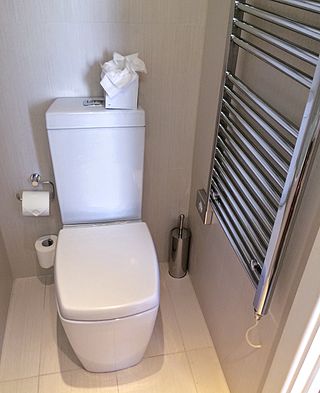
A flush toilet is a toilet that disposes of human waste by using the force of water to channel it through a drainpipe to another location for treatment, either nearby or at a communal facility. Flush toilets can be designed for sitting or squatting, in the case of squat toilets. Most modern sewage treatment systems are also designed to process specially designed toilet paper. The opposite of a flush toilet is a dry toilet, which uses no water for flushing.

Windsor Locks is a town in Hartford County, Connecticut, United States. The town is part of the Capitol Planning Region. As of the 2020 census, its population was 12,613. It is the site of Bradley International Airport, which serves the Greater Hartford-Springfield region and occupies approximately a third of the town. Windsor Locks is also the site of the New England Air Museum.

The Soo Locks are a set of parallel locks, operated and maintained by the United States Army Corps of Engineers, Detroit District, that enable ships to travel between Lake Superior and the lower Great Lakes. They are located on the St. Marys River between Lake Superior and Lake Huron, between the Upper Peninsula of the U.S. state of Michigan and the Canadian province of Ontario. They bypass the rapids of the river, where the water falls 21 ft (6.4 m). The locks pass an average of 10,000 ships per year, despite being closed during the winter from January through March, when ice shuts down shipping on the Great Lakes. The winter closure period is used to inspect and maintain the locks.
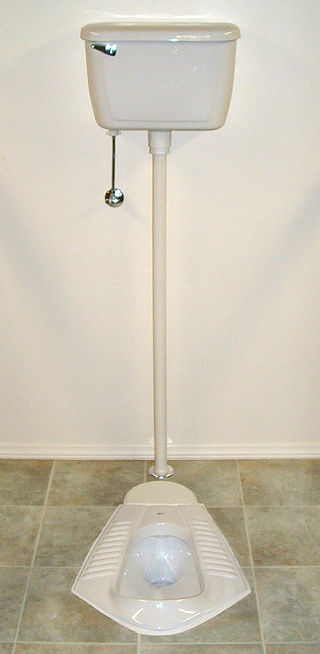
A squat toilet is a toilet used by squatting, rather than sitting. This means that the posture for defecation and for female urination is to place one foot on each side of the toilet drain or hole and to squat over it. There are several types of squat toilets, but they all consist essentially of a toilet pan or bowl at floor level. Such a toilet pan is also called a "squatting pan". A squat toilet may use a water seal and therefore be a flush toilet, or it can be without a water seal and therefore be a dry toilet. The term "squat" refers only to the expected defecation posture and not any other aspects of toilet technology, such as whether it is water flushed or not.
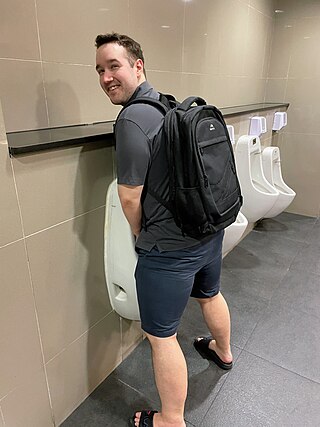
A urinal is a sanitary plumbing fixture for urination only. Urinals are often provided in public toilets for male users in Western countries. They are usually used in a standing position. Urinals can be with manual flushing, automatic flushing, or without flushing, as is the case for waterless urinals. They can be arranged as single sanitary fixtures or in a trough design without privacy walls. Urinals designed for females also exist but are rare. It is possible for females to use stand-up urinals using a female urination device.
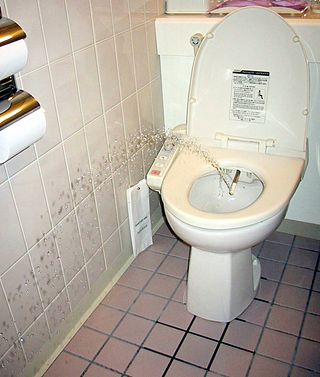
Toilets in Japan are sometimes designed more elaborately than toilets commonly seen in other developed nations. European toilets occasionally have a separate bidet whilst Japan combines an electronic bidet with the toilet. The current state of the art for Western-style toilets in Japan is the bidet toilet, which as of March 2016 is installed in 81% of Japanese households. In Japan, these bidets are commonly called washlets, a brand name of Toto Ltd., and they may include many advanced features rarely seen outside of Asia. The basic feature set commonly found on washlets consists of anal hygiene, bidet washing, seat warming, and deodorization.
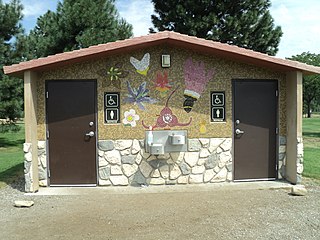
A public toilet, restroom, public bathroom or washroom is a room or small building with toilets and sinks for use by the general public. The facilities are available to customers, travelers, employees of a business, school pupils or prisoners and are commonly separated into male and female toilets, although some are unisex, especially for small or single-occupancy public toilets, public toilets are sometimes accessible to people with disabilities. Depending on the culture, there may be varying degrees of separation between males and females and different levels of privacy. Typically, the entire room, or a stall or cubicle containing a toilet, is lockable. Urinals, if present in a male toilet, are typically mounted on a wall with or without a divider between them. Local authorities or commercial businesses may provide public toilet facilities. Some are unattended while others are staffed by an attendant. In many cultures, it is customary to tip the attendant, especially if they provide a specific service, such as might be the case at upscale nightclubs or restaurants.

Joseph Bramah was an English inventor and locksmith. He is best known for having improved the flush toilet and inventing the hydraulic press. Along with William Armstrong, 1st Baron Armstrong, he can be considered one of the two fathers of hydraulic engineering.
A pay toilet is a public toilet that requires the user to pay. It may be street furniture or be inside a building, e.g. a shopping mall, department store, or railway station. The reason for charging money is usually for the maintenance of the equipment. Paying to use a toilet can be traced back almost 2000 years, to the first century BCE. The charge is often collected by an attendant or by inserting coins into an automatic turnstile; in some freestanding toilets in the street, the fee is inserted into a slot by the door. Mechanical coin operated locks are also used. Some more high tech toilets accept card or contactless payments. Sometimes, a token can be used to enter a pay toilet without paying the charge. Some municipalities offer these tokens to residents with disabilities so these groups aren't discriminated against by the pay toilet. Some establishments such as cafés and restaurants offer tokens to their customers so they can use the toilets for free but other users must pay the relevant charge.
The National Public Toilet Map is part of the Australian government's National Continence Management Strategy (NCMS). The map allows more Australians with urinary and fecal incontinence problems to live and participate in their communities with dignity and confidence, by making it easier for them to find information about the location of public toilets.

The Willamette Falls Locks are a lock system on the Willamette River in the U.S. state of Oregon. Opened in 1873 and closed since 2011, they allowed boat traffic on the Willamette to navigate beyond Willamette Falls and the T.W. Sullivan Dam. Since their closure in 2011, the locks have been classified to be in a "non-operational status." In 2023, work began to repair the locks, which are expected to reopen in 2026.

Unisex public toilets are public toilets that are not separated by gender or sex.

Kwikset is an American lock and lockset manufacturer owned by Assa Abloy. Originally Gateway Manufacturing Company, Kwikset was founded in California in 1946 by Adolf Schoepe, and Karl Rhinehart.

A female urinal is a urinal designed for the female anatomy to allow for ease of use by women and girls. Different models enable urination in standing, semi-squatting, or squatting postures, but usually without direct bodily contact with the toilet. Sitting models also exist, and are designed for body contact with the urinal.

Accessible toilets are toilets that have been specially designed to better accommodate people with physical disabilities. Persons with reduced mobility find them useful, as do those with weak legs, as a higher toilet bowl makes it easier for them to stand up. Additional measures that can be taken to add accessibility to a toilet include providing more space, adding grab bars to ease transfer to and from the toilet seat, and providing extra room for a caregiver if necessary. Some countries have requirements concerning the accessibility of public toilets. Toilets in private homes can be modified (retrofitted) to increase accessibility.
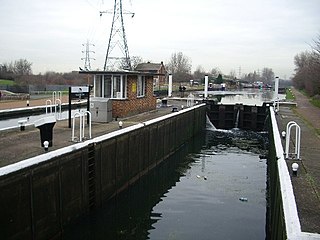
Stonebridge Lock (No16) is a paired lock on the River Lee Navigation in the London Borough of Haringey, England and is located near Tottenham, London. Like other locks as far as Ponder's End Lock it is large enough to take barges of up to 130 tons. The primary lock has been upgraded to mechanical operation, but the secondary lock is operated manually.

A toilet is a piece of sanitary hardware that collects human urine and feces, and sometimes toilet paper, usually for disposal. Flush toilets use water, while dry or non-flush toilets do not. They can be designed for a sitting position popular in Europe and North America with a toilet seat, with additional considerations for those with disabilities, or for a squatting posture more popular in Asia, known as a squat toilet. In urban areas, flush toilets are usually connected to a sewer system; in isolated areas, to a septic tank. The waste is known as blackwater and the combined effluent, including other sources, is sewage. Dry toilets are connected to a pit, removable container, composting chamber, or other storage and treatment device, including urine diversion with a urine-diverting toilet.
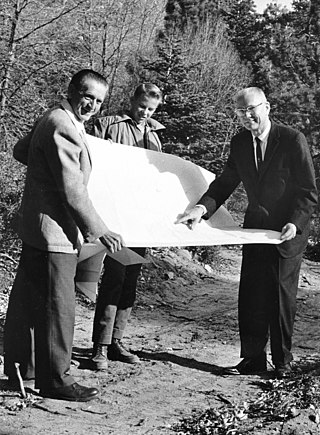
Adolf Schoepe was a German-American inventor and businessman.

An electronic toilet or eToilet is a type of public toilet that is used in India. The increase in the use of eToilets is in support of Swachh Bharat Abhiyan which intends to reduce the practice of open defecation.

















